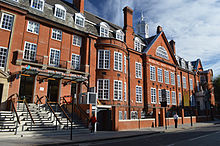Working Men's College
 |
|
| Motto | Auspicium Melioris Aevi |
|---|---|
| Type | Adult Education |
| Established | 1854 |
| Principal | Satnam Gill |
|
Administrative staff
|
125 |
| Students | 4000 |
| Location |
Somers Town, St Pancras, London, England 51°32′09″N 0°08′10″W / 51.535699°N 0.13602°WCoordinates: 51°32′09″N 0°08′10″W / 51.535699°N 0.13602°W |
| Website | www |
The Working Men's College (or WMC), is among the earliest adult education institutions established in the United Kingdom, and Europe's oldest extant centre for adult education. Founded by Christian Socialists, at its inception it was at the forefront of liberal education philosophy.
Founded in 1854 the College was established by Christian Socialists to provide a liberal education for Victorian skilled artisans to counter what its founders saw as the failings in practice of the social theory of Associationism. The founding of the College was also partially a response to concerns about the revolutionary potential of the Chartist Movement. Its early protagonists were also closely associated with the Co-operative Movement and labour organisations.
The College's founders – a view reached in 1904 – were Frederick Denison Maurice, (the first principal), Thomas Hughes (author of Tom Brown's Schooldays), John Malcolm Forbes Ludlow, Frederick James Furnivall, Lowes Cato Dickinson,John Westlake, Richard Buckley Litchfield and John Llewelyn Davies. Notable early promoters and supporters of the College and its foundation were Edward Vansittart Neale, Dante Gabriel Rossetti, John Ruskin,Charles Blachford Mansfield,John Stuart Mill, James Clerk Maxwell, and Charles Kingsley, (author of The Water-Babies), while later including G.M. Trevelyan, E. M. Forster, C.E.M. Joad and Seamus Heaney.
...
Wikipedia
